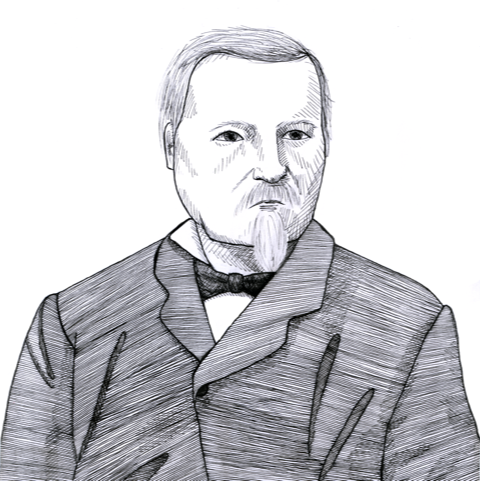Liberty Matters
Molinari’s Influence
 I’ve argued that Molinari was a likely influence on de Puydt, and a possible influence on Proudhon and Bellegarrigue. But none of these writers adopted Molinari’s specific proposal of competing security firms; de Puydt substituted competing service packages offered by a single monopoly, Bellegarrigue called for a monopoly security agency as well (albeit a voluntary one), and Proudhon’s proposal is too short on details – at least in the texts I’ve read.
I’ve argued that Molinari was a likely influence on de Puydt, and a possible influence on Proudhon and Bellegarrigue. But none of these writers adopted Molinari’s specific proposal of competing security firms; de Puydt substituted competing service packages offered by a single monopoly, Bellegarrigue called for a monopoly security agency as well (albeit a voluntary one), and Proudhon’s proposal is too short on details – at least in the texts I’ve read.So what influence, if any, did Molinari’s competitive-provision-of-security proposal have? It’s difficult to say. It would be particularly interesting to know whether Molinari influenced Benjamin Tucker, editor of Liberty (1881-1908 – almost exactly the same years as Molinari’s editorship of the Journal des Économistes), the leading individualist anarchist periodical of the 19th century U.S.
In 1887, Tucker described a system for security provision very much like the one advocated by Molinari:
There are many more than five or six Churches in England, and it frequently happens that members of several of them live in the same house. There are many more than five or six insurance companies in England, and it is by no means uncommon for members of the same family to insure their lives and goods against accident or fire in different companies. Does any harm come of it? Why, then, should there not be a considerable number of defensive associations in England, in which people, even members of the same family, might insure their lives and goods against murderers or thieves? ... [D]efence is a service, like any other service ... [and] competition prevailing, patronage would go to those who furnished the best article at the lowest price .... If, then, five or six States were to hang out their shingles, the people, I fancy, would be able to buy the very best kind of security at a reasonable price.[1]
Coincidence, or evidence of influence? Here’s the (purely circumstantial) evidence for each side:
Evidence for Molinari’s influence on Tucker:
1. Tucker is the 19th-century anarchist (other than those subsequently influenced by Tucker himself, such as Francis Tandy[2] whose proposal for security is most similar to Molinari’s.2. Tucker read French fluently, and kept au courant on contemporary French literature; and he was familiar with Molinari’s Journal des Économistes, describing it as the “foremost economic periodical of the world.”[3]3. Molinari was widely known in his day, with books reviewed by Henry James, Thorstein Veblen, and Lord Acton; and Tucker mentioned Molinari in 1888,[4]and published a book review about Molinari in 1904.[5]
Evidence against Molinari’s influence on Tucker:
1. Tucker mentions a number of thinkers who influenced him, but never mentions Molinari as having done so.2. It would be easy to be broadly familiar with Molinari without knowing about his production-of-security views, especially since their major statement had been published before Tucker’s birth.3. It would be odd for Tucker’s 1888 article not to mention Molinari’s anarchist side, had Tucker known about it. Moreover, the 1904 Liberty book review (printed in the editorial section, and so enjoying Tucker’s endorsement)[6] hailed Molinari as an anarchist on the basis of The Society of Tomorrow, making no mention of Molinari’s earlier commitment to still more anarchistic views, and it would again be odd for Tucker not to have mentioned this fact to the author had he known about it – and likewise odd for the author not to refer to it had Tucker mentioned it.
It would also be interesting to know how much influence Molinari had on 20th-century market anarchism, and particularly how early. Murray Rothbard, for one, seems to have been aware of Molinari as early as 1954 – but to have developed the core of his own theory by 1949;[7] he might perhaps have learned of Molinari from Robert LeFevre, Leonard Liggio, or Ralph Raico, but when? (In related news, LeFevre’s journal reprinted de Puydt’s “Panarchy” in 1966.)[8]
Endnotes
[1] Benjamin R. Tucker, “Contract Or Organism, What’s That To Us?,” Liberty, 30 July 1887; online: <http://fair-use.org/benjamin-tucker/instead-of-a-book/contract-or-organism>.
[2] See, e.g., Francis Dashwood Tandy, Voluntary Socialism: A Sketch (Denver, 1896), ch. 5; online: <https://praxeology.net/FDT-VS-5.htm>.
[3] Benjamin R. Tucker, “A French View of Boston Anarchists,” Liberty 6.4 (whole no. 134, 29 September 1888), p. 4; online: <http://libertarian-labyrinth.org/liberty/06-04.pdf>.
[4] Ibid.
[5] S.R. [probably S. H. Randall], “An Economist on the Future Society,” Liberty 14.23 (whole no. 385, 2 September 1904), p. 2; online: <https://praxeology.net/SR-GM-SF.htm>.
[6] The editorial page of Liberty begins with the announcement: “The appearance in the editorial column of articles over other signatures than the editor’s initial indicates that the editor approves their central purpose and general tenor, though he does not hold himself responsible for every phrase or word.”
[7][I owe this information to Brian Doherty, David Gordon, and Joseph Stromberg.
[8] Paul-Émile de Puydt, “Panarchy,” trans. Adrian Falk, Rampart Journal 2.3 (Fall 1966); I owe this information to Charles W. Johnson.
Copyright and Fair Use Statement
“Liberty Matters” is the copyright of Liberty Fund, Inc. This material is put on line to further the educational goals of Liberty Fund, Inc. These essays and responses may be quoted and otherwise used under “fair use” provisions for educational and academic purposes. To reprint these essays in course booklets requires the prior permission of Liberty Fund, Inc. Please contact oll@libertyfund.org if you have any questions.